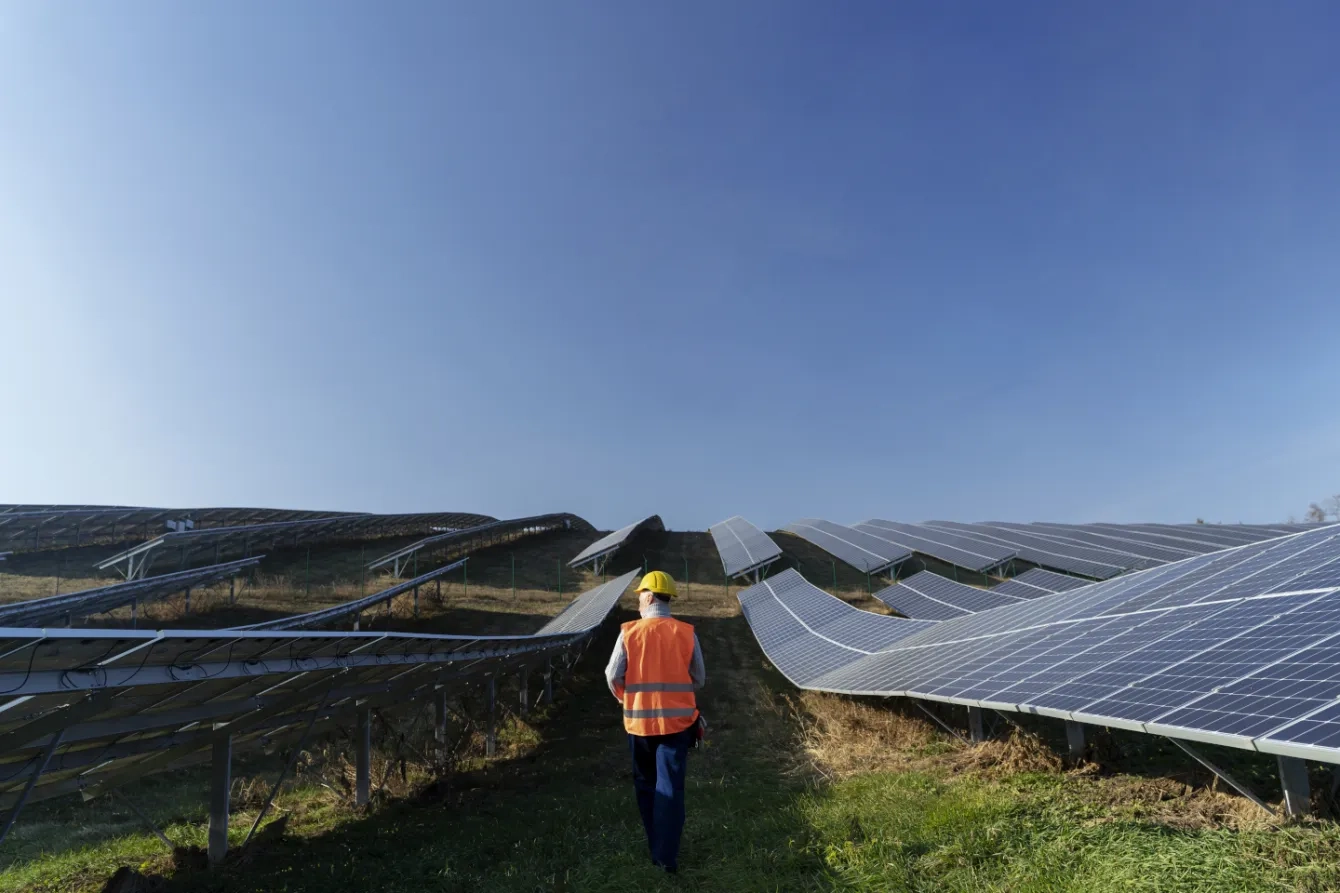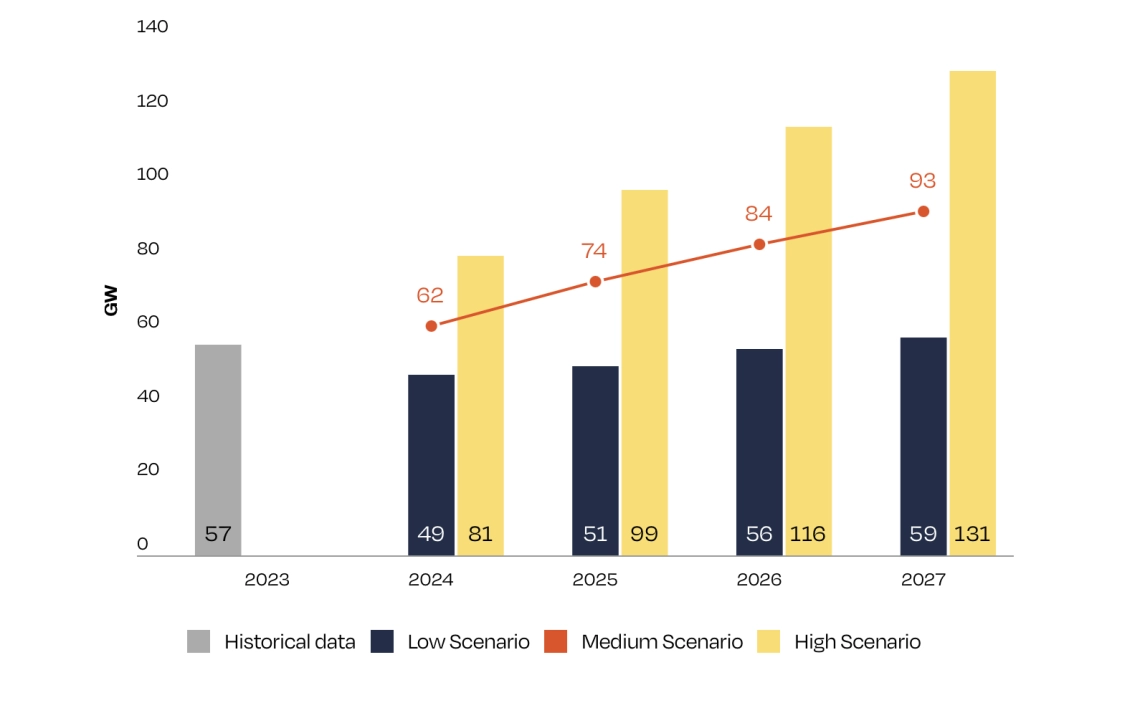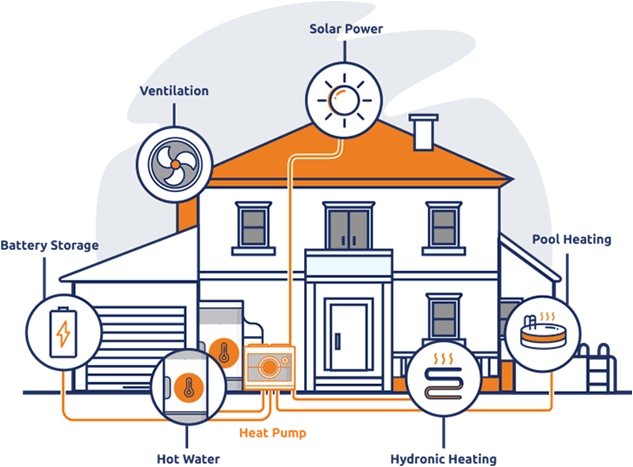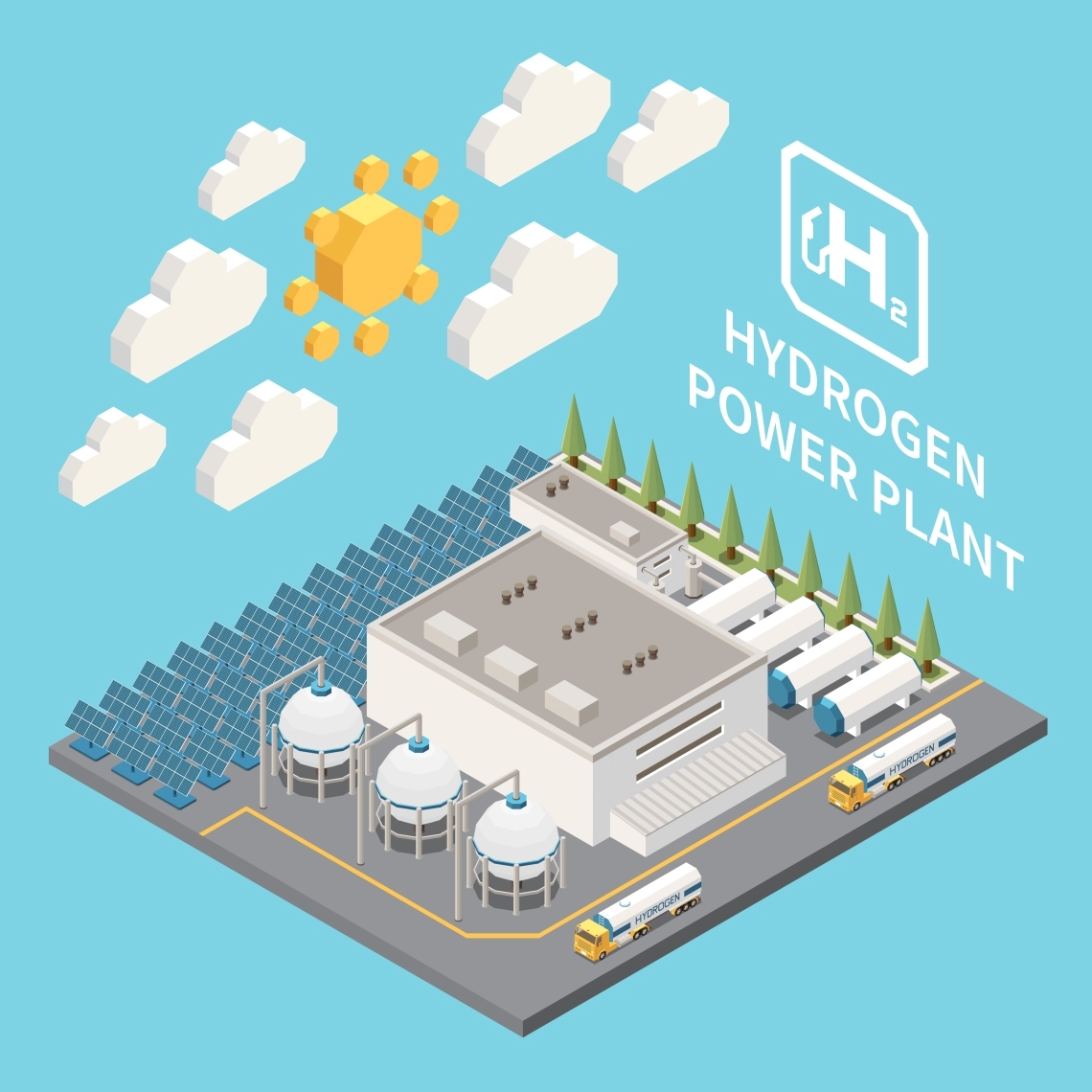
Detailed Forecast of Solar Energy Development in Europe for 2024-2027
General Overview
The European solar energy market is expected to continue to show steady growth between 2024 and 2027, mainly due to legislative initiatives, energy transition plans, and the desire for energy independence from Russian gas. Despite certain challenges such as permitting procedures, grid capacity constraints, and skills shortages, Europe will remain an important player in the global solar market.
Forecast of Capacity Installation The European Union (EU) is expected to increase its share of the global solar market to 19%, adding 120 GW of installed capacity by 2027. Growth will be fuelled by the EU's efforts to raise its 2030 renewable energy targets and reduce its dependence on Russian gas through the REPowerEU plan.

Key Markets and Key Players
- Germany: Expected to install more than 20 GW of new capacity in 2026, supported by both large-scale solar projects and the expansion of the rooftop solar market.
- Spain: Forecast to install 18.1 GW of new capacity in 2026, playing an important role in the national renewable energy strategy.
- Italy: Significant growth with more than 4 GW installed in 2023, showing considerable improvement from previous years.
Technological and Market Trends
- Lower Prices: Declining prices for solar modules and components make solar energy more attractive to consumers and investors.
- Development of Distributed Generation: Increased rooftop solar systems and energy storage technologies enable consumers to become energy producers, contributing to energy independence and efficiency.
- Integration with Other Renewable Energy Sources: Hybrid solar power plants, combining solar with other sources like wind and storage, provide a stable energy supply and additional services to the electricity grid.
Development of the Market for Hybrid Systems Combining Heat Pumps and Solar Power Plants in Europe from 2024
Context and Background Legislative Support and Policy Initiatives
- Green Deal: The European Commission continues to support initiatives aimed at reducing carbon emissions. The European Green Deal aims to make Europe climate neutral by 2050.
- Financial Instruments: Subsidies, tax breaks, and other financial incentives are provided for the introduction of renewable energy sources and energy-efficient technologies.
Market Growth and Trends 2024-2025
- Increased Demand: Steady growth in demand for combined heat and power systems due to a favourable legal framework and financial support.
- Infrastructure Development: Active installation of infrastructure to support integrated systems in new and renovated buildings.
2026-2028
- Technological Improvements: Reduced production costs and increased efficiency of heat pumps and solar panels.
- Mass Adoption: Deployment of systems in residential, commercial, and industrial facilities.

2029-2030
- Massive Integration with Smart Grids: Systems become part of smart grids, allowing efficient energy use and stable supply.
- Expanding Markets: Expansion into Eastern European markets due to lower technology costs and increased awareness.
Technological Innovations
Energy integration and management
- Intelligent control systems: The use of artificial intelligence to optimise the operation of heat pumps and solar panels, maximise efficiency and reduce energy costs.
- Battery systems: The development of battery technology allows for the storage of excess energy generated by solar panels and its use during peak periods.
High-performance components
- Improved materials: The use of new materials for solar panels and heat exchangers in heat pumps, which increases their efficiency and durability.
- Hybrid systems: Development of hybrid systems that combine heat pumps with other heat sources (e.g. gas boilers) to ensure a stable heat supply in all conditions.
Interaction with the energy system
Smart homes
- Automation: Integration of combined systems into smart homes to automatically manage energy consumption based on weather conditions and occupant needs.
- Energy efficiency: The use of intelligent systems to reduce energy losses and improve the overall energy efficiency of buildings.
Energy communities
- Local microgrids: The creation of energy communities where individual households come together to share energy produced by solar panels and heat pumps.
- Energy exchange: Implementation of technologies to share excess energy between community members, enabling more efficient use of resources.
Development of hydrogen production and storage systems from 2024
Hydrogen production and storage systems

Market growth and trends
2024-2025: Initial stage of hydrogen technology market expansion. Governments and the private sector are actively investing in research and development. The number of demonstration projects is expected to increase.
2026-2028: Start of mass production of hydrogen from renewable sources such as solar and wind energy. Development of infrastructure for hydrogen transportation and storage.
2029-2030: Widespread deployment of hydrogen technologies in the industrial sector, transport and energy systems. Hydrogen becomes a key element in reducing carbon emissions.
Technological innovations
New generation electrolysers: Development of more efficient and cost-effective electrolysers for the production of hydrogen from water using electricity from renewable sources.
- Hydrogen storage: Improving hydrogen compression, liquefaction and storage technologies to ensure its safe and efficient use.
- Integration with power systems: The use of hydrogen as energy storage in integrated power systems to balance loads and ensure uninterrupted energy supply.
Synergy of solar energy and hydrogen technologies
Hydrogen production using solar energy: Solar power plants can be used to power electrolysers that produce hydrogen. This allows excess energy generated during the day to be used to produce hydrogen, which can be stored and used at night or during peak demand periods.
- Energy storage and transportation: Hydrogen can be used as a storage medium for energy produced by solar power plants, allowing for more efficient use of renewable energy and reduced dependence on traditional sources.
- Use of hydrogen in various sectors: Hydrogen produced by solar energy can be used in various sectors, including transport (hydrogen fuel cells for cars, trucks, ships), industry (high-temperature processes) and energy (electricity generation in hydrogen power plants).
Implementation of Innovative Technologies in Business from Aklima Group and Mycond
Aklima Group of Companies, the exclusive representative of the British brand Mycond, is a leader in the implementation of innovative climate control technologies in Europe. Under the Mycond brand, the company and its partners actively develop the market for heat pumps and other energy efficiency equipment. Thanks to an effective business model of local exclusive franchises, Mycond provides partners the opportunity to quickly start and implement their business with minimal costs.

Benefits of Working with Mycond
- High-quality equipment at a reasonable price: Mycond offers its customers reliable and efficient climate control equipment that meets high quality standards, confirmed by Keymark certification and BAFA listing. At the same time, the equipment is available at competitive prices, which ensures strong demand for the brand's products in the European market.
- A complete business kit: Partners receive everything they need to successfully launch their business, including CRM and ERP software, marketing materials adapted to the local language, and websites. This allows you to launch your business and attract customers quickly and efficiently.
- Staff training programme: Mycond provides partners with a complete training programme for their staff and their customers, including sales, selection, design, installation and service training. This helps ensure a high level of service and customer satisfaction.
- Remote support department: Partners have access to a remote technical support department that works on the client's needs and partially serves their operations, providing assistance with marketing and lead generation in the local market, technical support for the partner's clients and assistance in other aspects of doing business. This allows us to quickly resolve any problems and maintain a high level of service without spending time searching for staff and training them.
- Software services: Mycond offers a wide range of software services to help you start and run your business quickly and efficiently. This includes CRM systems for managing customer interactions, ERP systems for managing business processes, as well as other tools for optimising and improving the quality of work.
- Availability of equipment: The equipment is available both in warehouses in Europe and for wholesale ordering from factories. This allows partners to receive products quickly and meet the needs of their customers.
- Financial accessibility: It is possible to start a joint partnership business from as little as €5,000. In addition, there are funding programmes for partner businesses to purchase equipment, making this business accessible to a wide range of entrepreneurs.
Conclusion
The local exclusive franchise model offered by Aklima and Mycond ensures a quick and efficient business launch with minimal start-up costs. Partners receive a complete business kit, including software, marketing materials, staff training, and technical support. This allows them to focus on sales and providing high-quality customer service locally while Aklima Group's qualified employees assist with strategic business development. Fill out the form to receive the terms of cooperation.